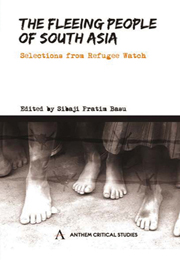Book contents
- Frontmatter
- Contents
- Acronyms and Abbreviations
- Foreword by Ranabir Samaddar
- Preface
- ETHICAL ISSUES
- LAWS
- SOUTH ASIA
- INDIA
- GENDER
- Introduction
- Refugee Repatriation: A Politics of Gender
- Families, Displacement, Partition
- Widows of Brindaban: Memories of Partition
- Agony Continues: Refugee Women of Bhutan
- Dislocating Women and Making the Nation
- Geder, Media and the Tsunami
- Why Should we Listen to Her?
- Women, Trafficking and Statelessness
- The Bar Dancer and the Trafficking Migrant: Globalization and Subaltern Existence
- INTERVIEW/CORRESPONDENCE
- REPRESENTATIONS
- Index
Widows of Brindaban: Memories of Partition
from GENDER
Published online by Cambridge University Press: 05 March 2012
- Frontmatter
- Contents
- Acronyms and Abbreviations
- Foreword by Ranabir Samaddar
- Preface
- ETHICAL ISSUES
- LAWS
- SOUTH ASIA
- INDIA
- GENDER
- Introduction
- Refugee Repatriation: A Politics of Gender
- Families, Displacement, Partition
- Widows of Brindaban: Memories of Partition
- Agony Continues: Refugee Women of Bhutan
- Dislocating Women and Making the Nation
- Geder, Media and the Tsunami
- Why Should we Listen to Her?
- Women, Trafficking and Statelessness
- The Bar Dancer and the Trafficking Migrant: Globalization and Subaltern Existence
- INTERVIEW/CORRESPONDENCE
- REPRESENTATIONS
- Index
Summary
At present, 2910 Bengali widows are struggling to survive in Brindaban. A number of them had come to Brindaban during the partition of India. Even now, 29 years after the creation of Bangladesh, Brindaban exerts a pull on the hapless and the helpless spending uneasy days and nights in Khulna or Chittagong. These women live in abject poverty, chanting ‘Radheshyam’ for their livelihood. Given below are interviews with some of these women. The interviews were taken by Subhoranjan Dasgupta who sensitively chronicled their agonizing memories of violence.
ILA BANDYOPADHYAY
An 86-year-old who came to Brindaban straight from Brandipara in Jessore district in 1947. ‘I came to live in Brandipara after my marriage. My in-laws were well placed and influential. My husband was an MBBS doctor. I had three sons – the oldest was in Class X, the next in Class V and the youngest in Class IV. They went to the market and did not return, not one. No trace of them could be found. After that our house was attacked and our dispensary was burnt down at that point my husband decided, “We are going to leave today.” ’
In the dead of the night we left and entered Bongaon. There he said, ‘We have had enough of samsar, let us go to Brindaban straight. We shall die there. Since then we have been living in Brindaban. My husband who died ten years ago used to pray at Paglababa's ashram and I used to chant Hari's name in a dharmasala.
- Type
- Chapter
- Information
- The Fleeing People of South AsiaSelections from Refugee Watch, pp. 311 - 314Publisher: Anthem PressPrint publication year: 2009

